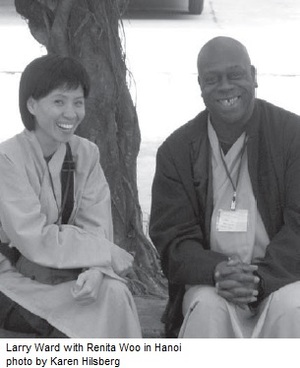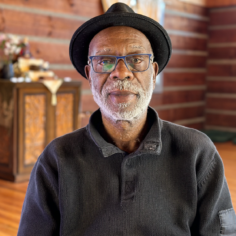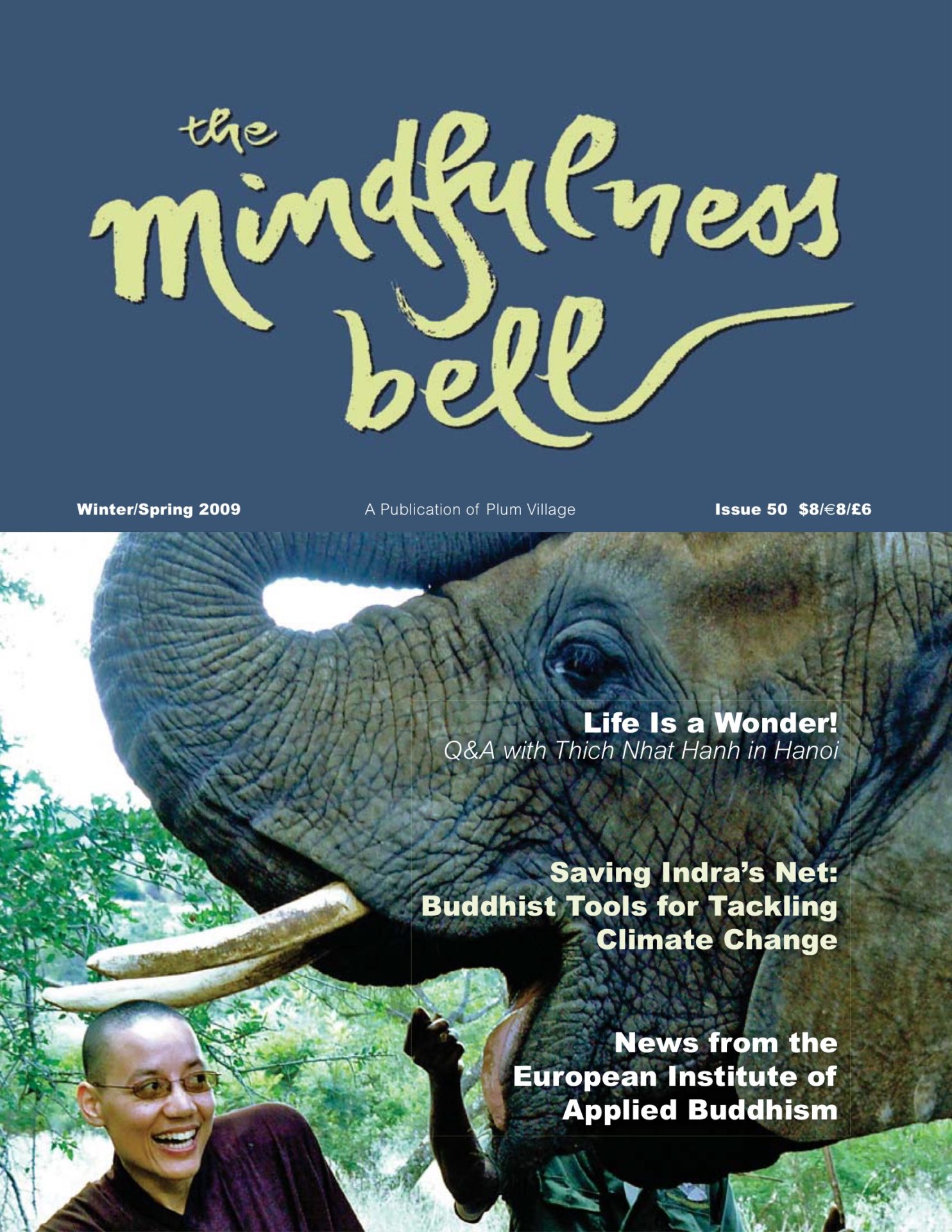By Dr. Larry Ward in February 2009

Many of us understand the Buddha as a doctor who shared and continues to offer his medicine of the teachings and practice to us. This great offering is to help us in healing and transforming our individual and collective suffering. One can say the medicine of Buddhism is truly deep and lovely. It is the medicine of waking up the good within our hearts and minds.
By Dr. Larry Ward in February 2009

Many of us understand the Buddha as a doctor who shared and continues to offer his medicine of the teachings and practice to us. This great offering is to help us in healing and transforming our individual and collective suffering. One can say the medicine of Buddhism is truly deep and lovely. It is the medicine of waking up the good within our hearts and minds.
Something today is different. And I’m kind of slow so it takes me a while to figure things out. What I finally realized is that for thousands of years the question of salvation has been “What must I do to be saved?” This is the central question of our spiritual traditions. But you and I live in the first moment in history in which this question is now expanded to “What must we do to be saved?” And by “we” I mean the whole planet. I mean every person, every race, every tribe, every nation, every organization and wholesome spiritual tradition. I am aware that this is a challenging way to describe the salvation question. However, it does not leave behind the question of individual liberation but dares us to remember our deep Bodhisattva vows.
It is not only humans and institutions who are asking this question of salvation. The snow-capped mountains and the deep blue oceans are asking the question. The trees and the land itself are calling to us: “What must we do to be saved?”
Opening Dharma Doors
We have been experimenting in the Plum Village Sangha with ways of opening Dharma doors in response to this question. I want to name a few of the doors for you so that you might get a fresh idea on a door you might open where you practice, where you live, and where you serve the Dharma.
Recently I was involved in leading a retreat for an organization in Canada that is committed to working with AIDS in Africa. The retreat was designed to help those involved in the aid work to be nourished and not to burn out or to be overwhelmed by the grief they experience every single day that they give their lives to the service of the children and the women and the men suffering from AIDS.
A few years ago we had a wonderful retreat for individuals involved in law enforcement and criminal justice — police officers, lawyers, parole officers, and social workers. We engaged that group of people in exploring what it means to be a Bodhisattva, what it means to engage mindfully in their work in the world. We offered the Five Mindfulness Trainings to many who desired to practice them in the context of their daily life and work.
I can tell you that the retreat, which was attended by several hundred people, was a transformational experience. I am sure that the communities and institutions they went back to serve found that the quality of kindness and thoughtfulness and compassion had been nourished and grown.
We’ve offered a retreat for individuals connected to the entertainment industry — filmmakers, artists, writers, and poets. It was held at Deer Park Monastery in Southern California, not far from Hollywood.
In the fall of last year we participated in a conference for people who are therapists and psychiatrists, called Mindfulness in Psychotherapy; 1800 people showed up at UCLA. Their capacity to embody mindfulness while they care for and serve their clients increased in wholesome ways.
We now offer annual family retreats for couples and for families with children. Young people are getting together for camps — songs, art, poetry, yoga, and meditation practice; this is a very successful annual gathering of young people. Students have had special retreats designed to introduce them to the benefits and principles of mindfulness practice.
Over the last few years we have offered “people of color” retreats in the United States for minorities to support these individuals and groups in the practice of mindfulness. This effort is enabling the teachings to go with people back to the neighborhoods, communities, and local institutions. I can report to you that there are schools in the United States where the classroom morning begins with the sound of the bell. I can report to you that there are young people in difficult situations who come to class and enjoy meditation and the tea ceremony.
Thay has already mentioned the work at Plum Village with Palestinians and Israelis, but you should also know that many of our colleagues are creating special initiatives on their own that are taking place every week, every day, to build peace and to foster reconciliation.
We have had gatherings of business people to talk about mindfulness and ethics and what it means to be a business person who practices mindfully. This includes mindfully developing products and mindfully managing their profit. The Buddha did not complain about business people, the Buddha only wanted to make sure that we made money the right way, without causing suffering, and that when we made it, we spent it the right way, without causing suffering.
We’ve had veterans’ retreats in the United States, for many years offered by Thay and the Plum Village Sangha. You may have already encountered the tremendous transformation and healing of some of the veterans of many wars, including the Vietnam War.
What We Are Learning
What we are learning through the process of offering so many different kinds of retreats and mindfulness days to so many different people and professions is three-fold. First, the post-modern mind or soul is seeking an experience of transformation and healing more than an explanation of transformation and healing. If an explanation comes along after I’m healed, or while I’m getting healed, it’s deeply appreciated.
The second thing we are learning is that offering the medicine of our tradition is not a matter of conversion. It is not a question of religious roots but rather a question of generating authentic aspiration. This is a matter of offering the Buddhist teaching with clarity and practical relevance through humble sincerity.
The third aspect is that this way of transmitting the teachings is about application and translation. Depth scholarship is certainly important but we must find new ways it can be applied to the suffering that is pervasive in our time and space. This is crucial if we are to untie the internal and social knots that block us from our best selves and best societies.
Seeds of a New Society
So the true value of the teaching is not trapped in the form of its delivery. Skillful means is one of the fundamental teachings the Buddha has given us to help living beings to relieve their suffering. The practices that we have been given by the Buddha and all of our teachers after him can be applied in every kind of situation — if we apply them without attachment to form.
In the midst of these very concrete retreats and mindfulness days we have found that sometimes the Dharma Gates of Liberation open wide. While sharing the practices of sitting, walking, eating meditation, deep relaxation, Dharma talks and discussion, deep listening, and loving speech, people find themselves not only healed but transformed.
If you look and listen closely, you will see that we are in the midst of a new kind of society. But the kind of society that you and I would be happy living in, and most people I know on this planet would be happy living in, is not yet here. The seeds of it are here. However, the new society that is just, democratic, and civilized can only take place on the ground of a new spiritual sensibility. And, brothers and sisters, we are that ground — the ground of that fresh spiritual sensibility of the post-modern age.
You may ask where the Buddha is in all of this. Master Lin Chi reminds us that the Buddha is not a statue. Other ancestral teachers remind us if we are going to find the Buddha we should look close, close to where we are, close to our heart, close to our own mind, or we will not find him, or we will not find her.
In closing I offer you a poem from this week’s experience:
We engage through our love,
opening 10,000 Dharma Doors
with a true mind and a true heart.
What do we call this urgency, this Buddhism?
It matters not.
The sun rises and the moon shines without confusion.
Listen to the frogs — do they remind you of anyone?
The bamboo chimes dance in the wind without clinging.
Our chants sing out beauty
like the birds greeting the morning sun.
We are here to be engaged, to remember the promise
we made, many lifetimes ago,
the promise not to leave anyone behind,
the promise not to ignore the suffering of any being.
The promise to remember our noble calling —
It has not changed.
It is still:
Wake up, wake up, wake up.


